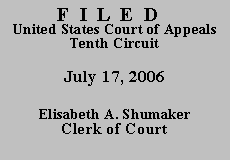

| TIMOTHY LEE SUNDAY, |
|
On November 6, 1992, a jury convicted Mr. Sunday of five counts of sexual battery in Craig County District Court, Oklahoma. On February 8, 1993, he was sentenced to one-year imprisonment on each of the five counts.(1) R. Doc. 6 at Ex. 1. He did not file a direct appeal from his conviction. See R. Doc. 11, Ex. A. On March 30, 2005 he filed an application for post-conviction relief in state court, R. Doc. 1, Ex. 2, which was rejected as untimely and frivolous. R. Doc. 13 at 2; Doc. 1, Ex. 1. Nothing in the record indicates Mr. Sunday filed any other form of post-conviction appeal.
On April 18, 2005, Mr. Sunday filed his federal habeas petition. See R. Doc. 1. In its amended form, he challenged his conviction and multiple sentences on several grounds. See R. Doc. 4. On January 9, 2006, without addressing Mr. Sunday's constitutional claims, the district court dismissed his habeas petition as time-barred by the one-year limitations period in 28 U.S.C. § 2244(d)(1). R. Doc. 13. Mr. Sunday filed a notice of appeal and request for a COA on January 24, 2006. R. Doc. 17. On January 26, the district court denied his request. R. Doc. 22 at 2. When the district court denies a habeas petition on procedural grounds and fails to address the prisoner's constitutional claims, we may issue a COA only if the prisoner demonstrates that it is reasonably debatable whether (1) the petition states a valid claim of the denial of a constitutional right, and (2) the district court's procedural ruling is correct. Slack, 529 U.S. at 484.
On appeal, Mr. Sunday argues the merits of his claims and that the district court erred in determining that his action is barred by limitations. The district court's conclusion that Mr. Sunday claims are time-barred is not reasonably debatable. The Antiterrorism and Effective Death Penalty Act (AEDPA), enacted on April 24, 1996, provides that a "1-year period of limitation shall apply to an application for a writ of habeas corpus by a person in custody pursuant to the judgment of a State court." 28 U.S.C. § 2244(d)(1). This limitation period usually commences on "the date on which the judgment became final by . . . the expiration of the time for seeking [direct] review." 28 U.S.C. § 2244(d)(1)(A). However, a state prisoner whose conviction became final on or before April 24, 1996 must file his § 2254 motion on or before April 24, 1997. See United States v. Hurst, 322 F.3d 1256, 1260 (10th Cir. 2003); Hoggro v. Boone, 150 F.3d 1223, 1226 (10th Cir. 1998). Mr. Sunday did not file a direct appeal from his conviction, and thus it became final on February 18, 1993, ten days after the imposition of his judgment and sentence. See Rule 2.1(B), Okla. Stat. tit. 22, Ch. 18, app. Because Mr. Sunday's conviction became final before April 24, 1996, he had until April 24, 1997 to file his § 2254 petition. He did not file his § 2254 motion until April 18, 2005, almost eight years past the deadline.
The running of the limitations period would be tolled or suspended during the pendency of any post-conviction or other collateral proceeding filed during the one-year limitations period. See Hoggro, 150 F.3d at 1226. But a petition for post-conviction relief filed in state court after the limitations period has expired no longer serves to toll it. See Fisher v. Gibson, 262 F.3d 1135, 1142-43 (10th Cir. 2001). Thus, Mr. Sunday's March 30, 2005 application for post-conviction relief is of no consequence. And although the limitations period for § 2254 motions is subject to equitable tolling in extraordinary circumstances, Gibson v. Klinger, 232 F.3d 799, 808 (10th Cir. 2000), Mr. Sunday does not raise any reasons that support tolling here.
We GRANT IFP status, DENY a COA, and DISMISS this appeal.
Entered for the Court
Paul J. Kelly, Jr.
Circuit Judge
1. Mr. Sunday is presently serving a sentence imposed for a conviction other than the one in this collateral attack. R. Doc. 4 at 2. It appears that the conviction here was used in Alabama habitual offender proceedings, which Mr. Sunday may be challenging in Alabama federal court. Id. at 3.